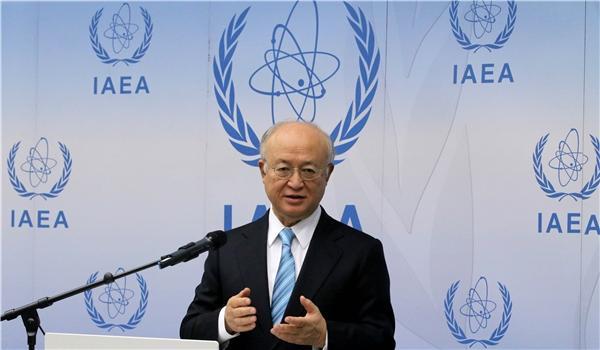Iran's Nuclear Accord Reaches Implementation Day
On 16th of January, 6 months after signing of the historic Iran nuclear deal, the International Atomic Energy Agency (IAEA) certified that Iran had indeed fulfilled all the terms required for lifting of the sanctions. The Director General of IAEA, Yukiya Amano, released a report “confirming that Iran has completed the necessary preparatory steps to start the implementation of the Joint Comprehensive Plan of Action.”

IAEADirector General Yukiya Amano's Statement in Vienna on Saturday
After a hectic set of parleys, the US and the EU fulfilled their side of the commitments, and lifted the sanctions that will release $100 billion of frozen Iranian assets along with a whole range of other measures imposed on Iran. As a part of its obligations, Iran has already “exported” to Russia 98% of its uranium stockpile, dismantled more than two-thirds of its centrifuges, and permanently disabled its plutonium producing Arak reactor, pouring cement into its core.
The US has been claiming that the July Agreement effectively blocks all avenues for Iran to advance its weapons program, a claim repeated by John Kerry again while announcing the lifting of sanctions. For Iran, this was never the issue. Time and again, they had offered to stop all such dual use activities, provided Iran’s right to the nuclear fuel cycle, granted under the Nuclear Non-proliferation Treaty (NPT), was accepted. With the US and the EU conceding this right under the July Agreement, it was relatively easy for Iran to give up its nuclear weapons program that they were using largely as a bargaining counter.
Many doubted that the US would actually lift the sanctions, and after Iran’s dismantling of its nuclear program, would weasel out of its obligations on one pretext or another. Saudi Arabia’s execution of the Shia cleric Nimr al-Nimr and its open break with Iran, the US boats entering Iran’s waters, threats of new US sanctions after Iran’s ballistic missile test, all were seen as portents for the US reneging on the July Agreement. This has not happened. The Obama administration has stood firm on fulfilling its obligations, as has Iran. For the neocons, this is another blow to their attempts to push the US into another disastrous war in West Asia.
We had written earlier that this agreement has broken the cycle of action-reaction that the two sides were locked into. For the first time after Shah’s fall and the US Embassy hostage crisis, there is now the possibility of a new normal in the US Iran relations. They are not going to be friends or allies in the region, as their interests would still clash on a host of issues. The US still remains wedded to regime change in Syria, is allied to the most reactionary regimes in the region, such as the Saudi and Gulf monarchies, and regards any country that has an independent policy as an enemy. The mere fact – as we witnessed during the violation of Iran’s territorial waters by the US naval boats – that normal diplomacy can prevail is itself a big change. On any incident, the two sides now can reach for the telephone instead of the gun.
One of the first results of the relations has been a prisoner exchange. Five US citizens, including a reporter from the Washington Post, have been exchanged with seven Iranians. Though the US press has talked of how the Iranians were sentenced under “independent judiciary” while the US citizens were all innocent, the fact is the Iranians were convicted of violating the US sanctions, that were illegal. We if course do not know how innocent the US citizens were.
The interdicting by Iran of the US naval boats in its waters could have become a stumbling block in the implementation of the July Accord. Fortunately, this was resolved within 24 hours, with Iran releasing the two boats and the US seamen. The US has yet to provide a credible explanation of how these two boats entered Iranian waters, that too at this critical juncture. Its first statement was that one of the boats had been “incapacitated” and floated into Iranian waters in distress. Iran’s seizure of the boats and the crew were projected as its “aggression”. The next explanation offered, and dutifully propagated by the western mainstream media, is that this was a “navigational error”, the officer commanding the boat had made a mistake. As Greenwald has written, neither of these explanations sound believable. Is it that sections in the US armed forces, who did not want normalisation with Iran were behind this? Or was it testing of Iran's defences, which the US Navy does periodically, occurred at a particularly inopportune time?
From the statements on both sides, it is clear that there is a desire to implement the July accord. Notwithstanding the renewed sanctions imposed on Iran for its missile test, even though the original raison d’etre for the sanctions – Iran's nuclear weapons program – no longer exits.
The July Agreement and its implementation will not change the strategic balance in the region, where the US and Iran are still regional competitors. Nevertheless, it will give both sides the possibility of joining hands for limited tasks. This could include the containment of Da'esh (or IS) or even partial engagement in Afghanistan. The US might want to have more flexibility than it has now, yoked as it is to Saudi and Turkey's West Asian policies.
One thing that will not change is the US Israeli relations. That will always trump any other interest that the US may have in the region. Whether we have an Obama, a Trump or a Clinton in the White House. The resistance axis – Hezbollah, Syria, Iran – will be always in the cross-hairs of the Us for this reason. To which we have to add Russia's re-entry into the region.
Disclaimer: The views expressed here are the author's personal views, and do not necessarily represent the views of Newsclick
Get the latest reports & analysis with people's perspective on Protests, movements & deep analytical videos, discussions of the current affairs in your Telegram app. Subscribe to NewsClick's Telegram channel & get Real-Time updates on stories, as they get published on our website.























